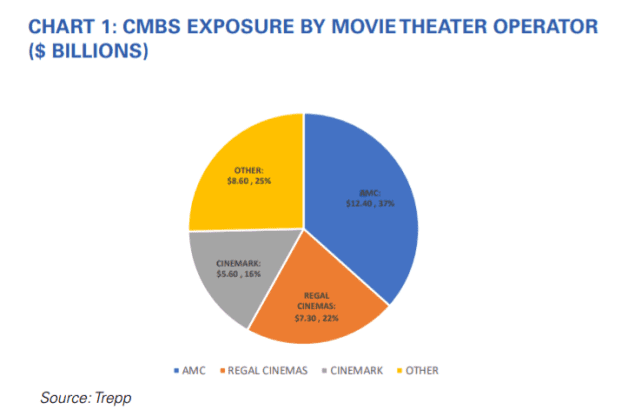# AMC, big movie chains are more than meme stocks to property bond investors

Table of Contents
“#
AMC, big movie chains are more than meme stocks to property bond investors
”
Can nostalgia save movie theaters?
“Nowhere special. I always wanted to go there,” said Gene Wilder’s character in Mel Brooks’ 1979 parody Western “Blazing Saddles,” a film NPR credited with setting “the gold standard” for the interracial buddy comedy “with its over-the-top jabs at racism and Hollywood.”
As more Americans venture out of lockdowns — and those in the West look to escape extreme heat — the appeal of going anywhere, even “nowhere special,” has deepened. But gathering in a movie theater with strangers? Commercial property bond investors weren’t always thrilled about the big, boxy setup of these buildings even before the pandemic hit.
“Uncertainty around the space, that’s been accelerated with COVID,” Goodson told MarketWatch. “It forces us to be more cautious.”
Roughly $34 billion worth of property loans have a movie theater operator as a top-five tenant, according to data provider Trepp, when looking at the broader $600 billion U.S. commercial mortgage bond market.
Trepp estimated that embattled AMC Entertainment Holdings Inc.
AMC,
a popular meme stock, had the largest real estate footprint of 20 operators in the sector at 37%, followed by Regal Cinemas at 22% and Cinemark Holdings Inc.
CNK,
at 16%.

Movie theater exposure
Trepp
“At AMC, we were within months or weeks of running out of cash five different times between April of 2020 and January of 2021,” said chief executive Adam Aron on the company’s May 6 first-quarter earnings call, while stressing that AMC’s outlook has “radically improved” since, including as more theaters have reopened during the pandemic.
The cash-burning AMC reported raising about $2.95 billion of fresh capital through equity or debt offerings, as part of the earnings report, and receiving about $1.2 billion of landlord or creditor concessions.
Shares of AMC fell 2.4% Friday, but advanced almost 2,700% on the year, while the S&P 500 index
SPX,
shed 1.3% Friday, but was still up 8.8% so far in 2021. U.S. stock indexes booked weekly declines Friday, underscored by the Dow’s worst weekly drop in about eight months, after the Federal Reserve offered a slightly more hawkish policy update, which also sent benchmark 10-year Treasury yield
TMUBMUSD10Y,
tumbling for a fifth week in a row.
AMC did not immediately respond to a request for comment for this article.
AMC boss Aron took to Twitter
TWTR,
this week to urge shareholders to vote to approve the sale of 25 million new shares, roughly six months from now.
Aron has cultivated a splashy following on social media with the meme-stock crowd, but as the former chief executive of Starwood Hotels & Resorts also has deep experience in real estate and commercial property finance.
Wall Street has been a key financier for owners of shopping malls, hotels, office buildings and other types of commercial properties since the late 1990s, when the velocity of loans packaged into bond deals took off.
A typical commercial mortgage bond deal might reach $1 billion and include loans on roughly 70 buildings of various property types coast-to-coast, in theory, a feature that can help insulate investors from downturns that hit a specific region or asset class.
For bondholders, that also means movie theaters, while large tenants, often only serve as part of the tenant mix at most properties, including in the $34 billion of mortgage debt tied to AMC and similar chains, which could be a saving grace.
“It’s not necessarily tied all specifically to movie theaters,” said Jen Ripper, investment specialist in mortgage bonds at Penn Mutual Asset Management. “In any given [bond] deal, a theater would tend to be pretty small in the big picture of a diversified conduit deal.”
Even so, Ripper said movie theaters are worth “keeping an eye on,” particularly since it’s unclear what, or how long, it will take to get movie seats filled at 2019 levels, or if that’s even possible.
“There’s a lot of competition with streaming services,” she said. “But I do think people like to go to the movies for the experience. Star Wars fanatics will probably go to the theater.”
And while empty shopping centers pose their own sets of problems for investors, Goodson sees added risk in owning mall property debt that has movie theaters in the mix.
“We have to acknowledge that the consumer is still in the midst of a change in terms of the way we consume, whether that’s services or goods or apparel,” he said. “We will forecast, generally, a lower recovery if the mall has a theater.”
See also: The streaming wars have a winner — in this real estate sector
By
Joy Wiltermuth
If you liked the article, do not forget to share it with your friends. Follow us on Google News too, click on the star and choose us from your favorites.
For forums sites go to Forum.BuradaBiliyorum.Com
If you want to read more News articles, you can visit our News category.



:max_bytes(150000):strip_icc():focal(780x395:782x397)/American-Airlines-Pilot-080223-tout-165b7ed4edf54a75926d4ca6392ec0c6.jpg)
